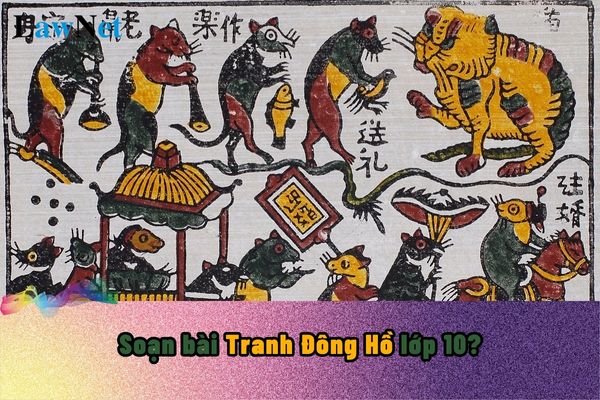Vietnam: What are the guidelines for preparing for the lesson "Dong Ho Paintings/Tranh Đông Hồ" in the 10th-grade Literature curriculum? Is the dominant emotions of a work one of the literary knowledge required for 10th-grade students?
What are the guidelines for preparing for the lesson "Dong Ho Paintings/Tranh Đông Hồ" in the 10th-grade Literature curriculum in Vietnam?
The lesson "Dong Ho Paintings/Tranh Đông Hồ" is one of the contents in the 10th-grade Literature curriculum that students will study.
Therefore, to prepare for the lesson before attending class, 10th-grade students can refer to the guidelines for preparing for the lesson "Dong Ho Paintings/Tranh Đông Hồ" in the 10th-grade Literature curriculum in Vietnam below:
|
Preparing for the lesson "Dong Ho Paintings/Tranh Đông Hồ" in the 10th-grade Literature curriculum * Main Content of the lesson "Dong Ho Paintings/Tranh Đông Hồ" |
*Note: The information about preparing the lesson "Dong Ho Paintings/Tranh Đông Hồ" is for reference only.

What are the guidelines for preparing for the lesson "Dong Ho Paintings/Tranh Đông Hồ" in the 10th-grade Literature curriculum in Vietnam? Is the dominant emotions of a work one of the literary knowledge required for 10th-grade students? (Image from the Internet)
Is being able to debate issues with opposing viewpoints a competence required for 10th-grade students in Vietnam?
Under Section 4 of the General education program in Literature issued with Circular 32/2018/TT-BGDDT, after studying literary texts in the 10th-grade Literature curriculum, students need to meet the following requirements:
- Write proficiently argumentative and expository texts on topics related to life and career orientation; write following the correct process, incorporating different expression methods, types of reasoning, and artistic elements; have independent thoughts on a social issue.
- Write argumentative and informational texts on relatively complex topics; argumentative texts require analyzing, evaluating, and comparing the value of literary works; discuss issues suitable for individuals nearing adulthood, demanding a complex structure and type of reasoning, with evidence needing to be sourced from multiple places; expository texts write about scientific issues in the form of a properly conventional research report; adhere to intellectual property rights and avoid plagiarism.
- Be able to express emotions, attitudes, experiences, and ideas of the individual on the issues raised in the text; express a perspective, way of thinking, and a lifestyle full of personality in essays.
- Be able to debate issues with oppositional viewpoints; have a receptive attitude and a suitable debate culture; have the ability to listen to presentations and evaluate the content and expression of the presentation; be interested in expressing personal opinions and personality in debates; present scientific issues confidently and persuasively; speak and listen flexibly; understand the method and process of conducting a debate.
Is the dominant emotions of a work one of the literary knowledge required for 10th-grade students in Vietnam?
Under sub-section 2 of Section 5 of the General education program in Literature issued with Circular 32/2018/TT-BGDDT, the literary knowledge required for 10th-grade students includes:
- The dominant emotions of a work
- The story, third-person narrator (omniscient narrator), first-person narrator (limited narrator), perspective in the story
- Some elements of epic, myth: space, time, plot, narrator, character, narrative voice and character's words, etc.; the value and vitality of the epic
- Aesthetic value of some formal elements in poetry
- Some elements of a cheo or folk tuong script: anonymity, themes, story, character, dialogue, transmission method, etc.
- Historical context or cultural, societal context and the work
- Basic understanding of Nguyen Trai to aid the understanding of some representative works of this author
- The closeness in content between literary works from different cultures
- The literary work and the reader.
Thus, after completing the 10th-grade Literature curriculum, students must master the dominant emotions of a work.

